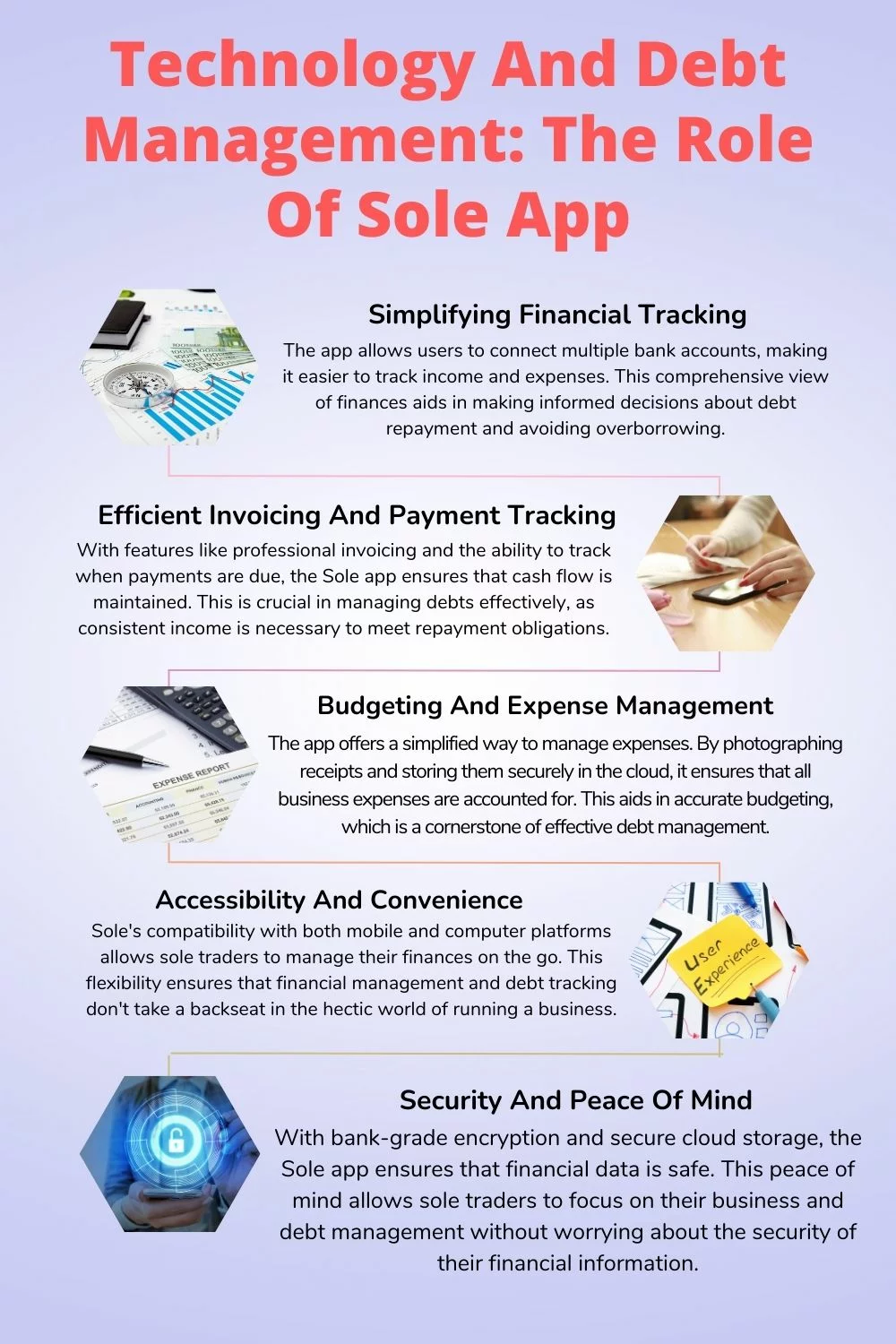As an Australian sole trader, managing debt effectively is crucial for maintaining financial stability and ensuring the longevity of your business. It’s common for small businesses and freelancers to rely on loans and credit lines to manage cash flow, invest in growth, or overcome short-term financial hurdles. However, without a solid strategy for debt management, these financial tools can quickly become overwhelming liabilities.
Understanding Your Debt
The first step in effective debt management is to understand the nature of your debts. This means identifying the total amount owed, the interest rates, the repayment terms, and any penalties for late payments. Knowing these details helps in prioritizing which debts to pay off first, typically those with the highest interest rates.
Budgeting And Financial Planning
An essential aspect of managing debt is effective budgeting and financial planning. As a sole trader, it’s vital to distinguish between personal and business expenses. Create a realistic budget that includes all income sources and expenses, and stick to it. This budget should allocate funds for debt repayments, ensuring that you consistently reduce your liabilities.

Cash Flow Management
Cash flow is the lifeblood of any business, particularly for sole traders. Effective cash flow management involves monitoring the timing of your income and expenses. Aim to speed up receivables where possible and negotiate better payment terms with suppliers to maintain a healthy cash flow, enabling you to meet debt obligations without strain.
Avoiding Overborrowing
One of the key traps for many sole traders is overborrowing. It’s tempting to take on more debt to finance business growth or cover shortfalls. However, overextending financially can lead to a debt spiral that is difficult to escape. Only borrow what is necessary and have a clear plan for how the funds will be used and repaid.
Debt Consolidation Options
For sole traders juggling multiple debts, debt consolidation can be an effective strategy. This involves combining various debts into a single loan, ideally with a lower interest rate. It simplifies repayments and can reduce the total interest paid over time.
Also Read: Top 10 Spreadsheet Tools: Excel To SoleApp 2024
Negotiating With Creditors
If you’re struggling with debt repayments, don’t hesitate to communicate with your creditors. Many are willing to negotiate payment plans or offer temporary relief, especially if they understand your business situation and your commitment to repaying what you owe.
Legal And Financial Advice
Seeking professional advice is often a wise step in managing business debts. Financial advisors and accountants can offer strategies tailored to your specific situation. They can also help in understanding complex financial products and ensuring compliance with Australian financial regulations.

Maintaining Good Credit
Your credit score plays a vital role in your ability to manage and obtain debt. Ensure timely payments of bills and debts, and regularly check your credit report for errors. A good credit score can secure better loan terms and interest rates, reducing the cost of future borrowing.
Planning For Emergencies
Unexpected events can quickly derail even the best debt management plans. Therefore, it’s important to have an emergency fund. This fund should cover several months of expenses, providing a financial buffer in tough times and reducing the need to take on additional debt.
Investing In Growth Wisely
While managing debt, don’t neglect investing in your business growth. This could be through marketing, new equipment, or expanding your product line. However, these investments should be made judiciously, ensuring they contribute to business growth and increased income, thereby aiding in debt repayment.
Technology And Debt Management: The Role Of Sole App
In the era of digital technology, Australian sole traders have access to tools that can significantly streamline financial management. One such tool is the Sole app, designed specifically for Australian sole traders and small businesses. The relevance of Sole app in debt management is multi-faceted.

Simplifying Financial Tracking
The app allows users to connect multiple bank accounts, making it easier to track income and expenses. This comprehensive view of finances aids in making informed decisions about debt repayment and avoiding overborrowing.
Also Read: Top 5 Expense Trackers For Businesses – Compare Now
Efficient Invoicing And Payment Tracking
With features like professional invoicing and the ability to track when payments are due, the Sole app ensures that cash flow is maintained. This is crucial in managing debts effectively, as consistent income is necessary to meet repayment obligations.
Budgeting And Expense Management
The app offers a simplified way to manage expenses. By photographing receipts and storing them securely in the cloud, it ensures that all business expenses are accounted for. This aids in accurate budgeting, which is a cornerstone of effective debt management.
Accessibility And Convenience
Sole’s compatibility with both mobile and computer platforms allows sole traders to manage their finances on the go. This flexibility ensures that financial management and debt tracking don’t take a backseat in the hectic world of running a business.
Security And Peace Of Mind
With bank-grade encryption and secure cloud storage, the Sole app ensures that financial data is safe. This peace of mind allows sole traders to focus on their business and debt management without worrying about the security of their financial information.
Building A Support Network For Debt Challenges
Another crucial aspect of effective debt management for Australian sole traders is building and utilizing a supportive network. This network can include fellow entrepreneurs, financial advisors, industry groups, and digital communities. Engaging with a network provides several benefits:

Sharing Knowledge And Experiences
One of the most significant advantages of a support network is the sharing of knowledge and experiences. Other business owners, especially those who have navigated debt management successfully, can offer valuable insights and practical tips. Learning from the experiences of others can prevent common pitfalls and inspire innovative strategies to manage and overcome debt.
Access To Professional Advice
A support network often includes professionals such as accountants, financial advisors, or lawyers who specialize in small business finance. These experts can provide tailored advice, help in understanding complex financial products, and offer solutions for managing debts more effectively.
Also Read: Top 6 Quoting Software For Aussie Businesses
Emotional Support And Encouragement
Managing debt can be stressful and isolating. A support network provides emotional support and encouragement, which is essential for maintaining a positive mindset. Knowing that others understand your challenges and are rooting for your success can be incredibly motivating.
Opportunities For Collaboration
Networking can open doors to collaborative opportunities that might help in reducing costs or increasing revenue. For instance, joint ventures or shared marketing initiatives can help in stretching resources further, thereby easing the financial burden and helping in debt repayment.
Staying Updated With Industry Trends
Staying informed about industry trends and changes in the financial landscape is crucial for effective debt management. A support network can be a valuable resource for this information, ensuring that you remain adaptable and can take advantage of opportunities as they arise.
Conclusion
Effective debt management is a critical skill for Australian sole traders. It requires a deep understanding of your debts, disciplined budgeting, strategic planning, and the willingness to seek advice and use technological tools like the Sole app. By implementing these strategies, you can ensure that debt remains a useful tool rather than a hindrance, paving the way for a successful and sustainable business.


